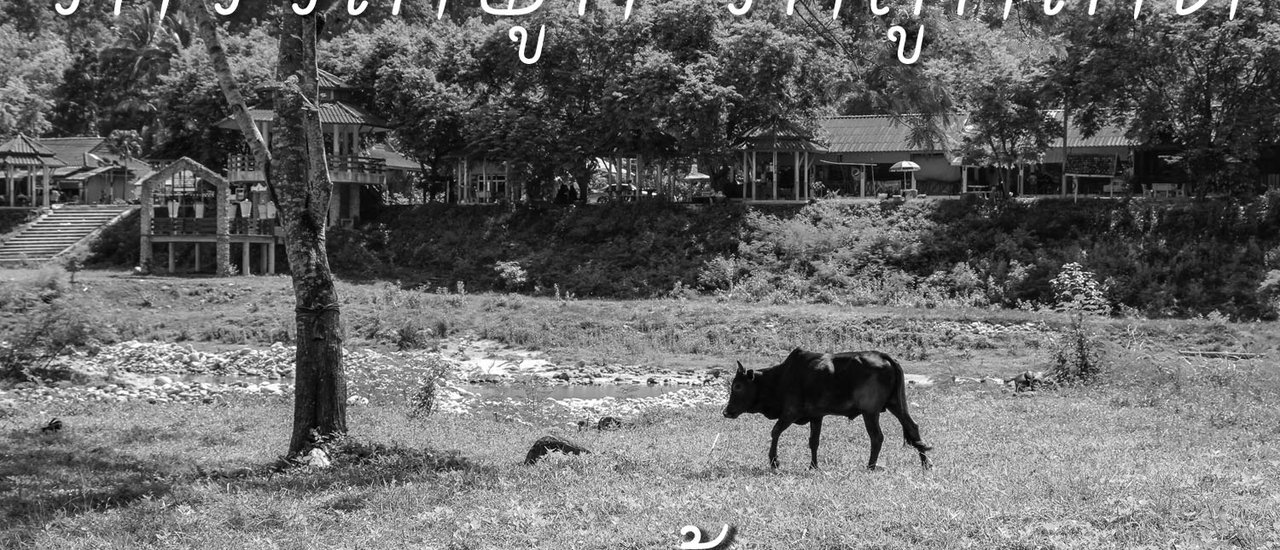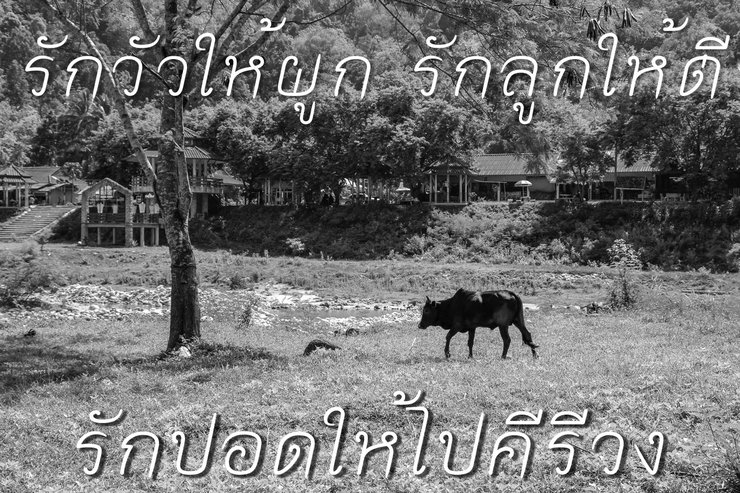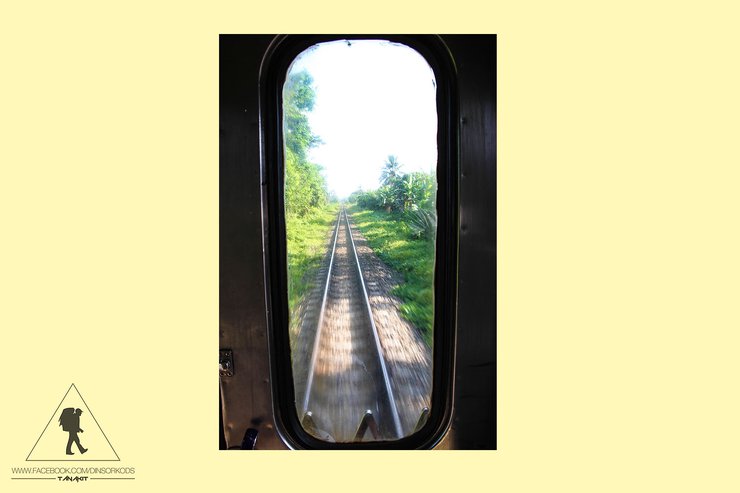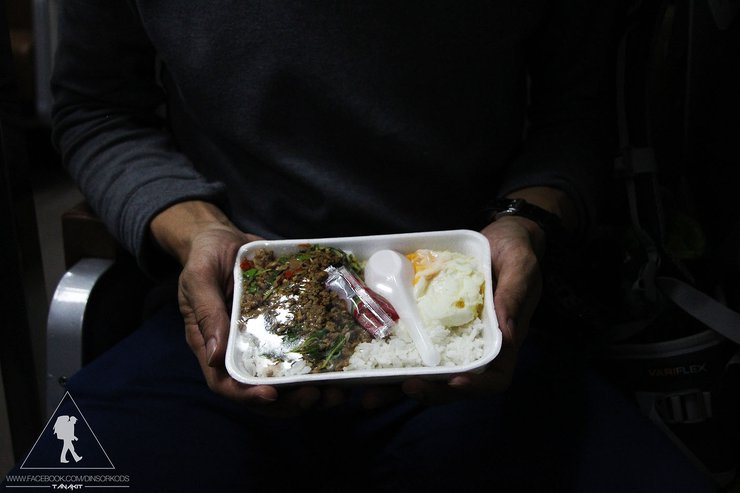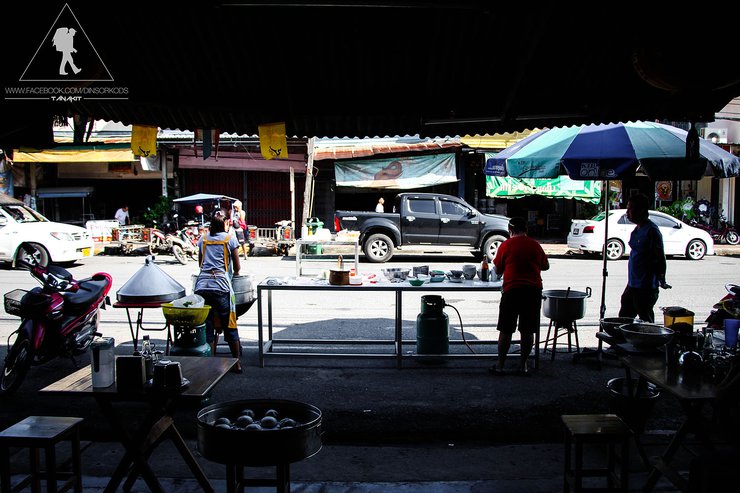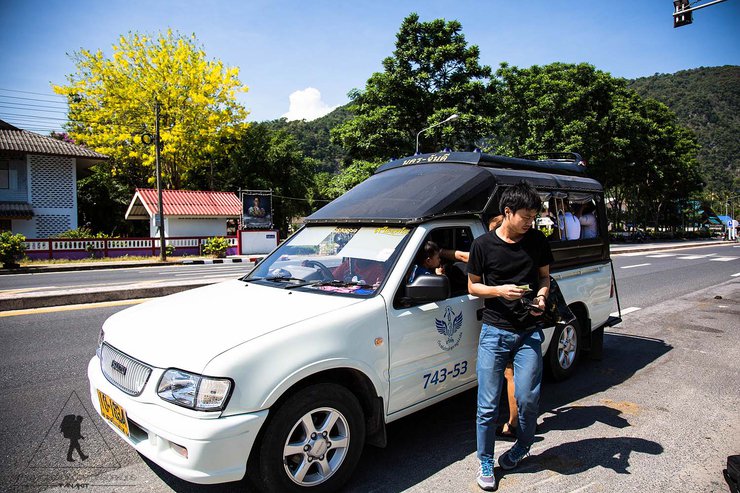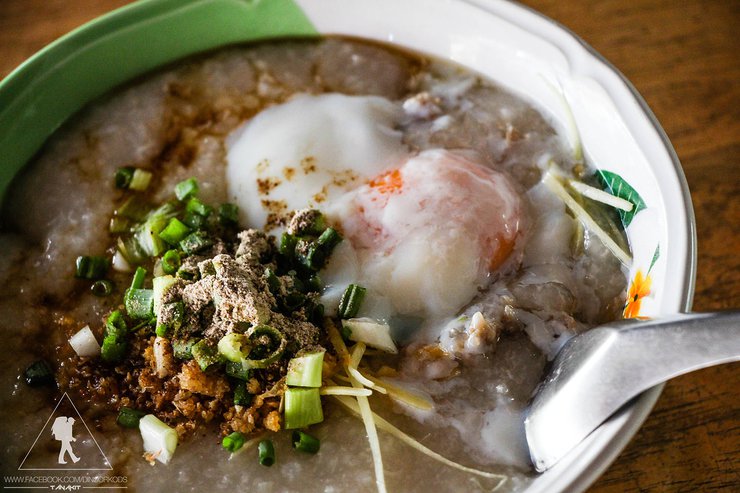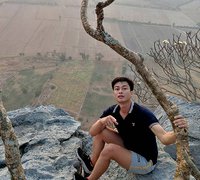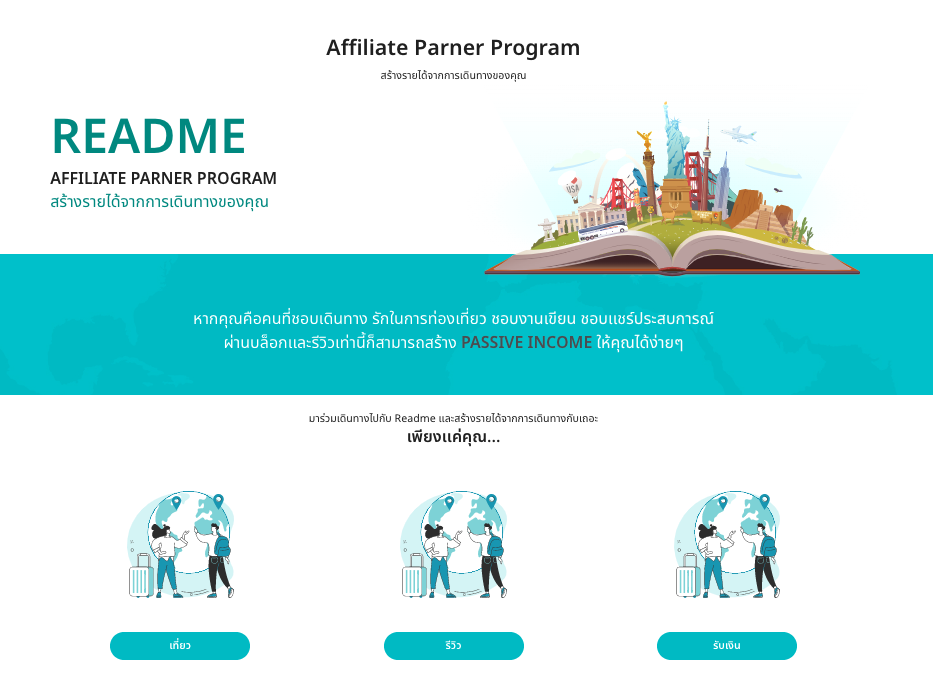
Upon returning to a solitary life, I reconnected with myself. I found time for introspection, self-reflection, and journeys with myself and a single companion. With time on our hands, we created simple conditions for the remaining moments.
This year's simple task for me is:
- Travel twice a month (domestic travel only)
- It takes three days to travel.
- One day, you will have to sleep in a tent (unless you don't go to the park).
- Budget should not exceed 2,500 baht (always exceeding the budget at the end of the trip)
First trip of the year >> https://pantip.com/topic/36122720
Today, I finished work at 3 pm and took a bus to Ramkhamhaeng University to catch the 113 bus to Hua Lamphong. However, I had to stop at the university's restroom because I had an upset stomach. Ramkhamhaeng University is my alma mater. Today, I saw many students, as many as 2B pencils, which reminded me that they were having exams. Old times automatically came back to me. After graduating from university, everyone has their own lives, which means working. As a result, we don't see our friends very often. Some people return to their hometowns, while others never see each other again after graduation. During our studies, we walked the same path, but after graduation, there are many forks and choices. It is a path that we have to choose ourselves, and most of the time, it is our own path.
After a peaceful moment in the bathroom and the hustle and bustle on the road, I arrived at Hua Lamphong Railway Station around six in the evening. The air-conditioned sleeper train, carriage number 12 on train number 36, bound for Khlong Jandee, moved slowly like an old turtle before gradually picking up speed like a young rabbit. The people in the carriage were sparse at the starting point and gradually became more crowded as we passed each station.
:: My friend Kai (a fellow traveler and college friend) and I ordered chicken basil rice while waiting for the staff to set up our beds. The train was moving, and the two backpackers with heavy backpacks and light wallets chose to sleep and wait for the new day, which came with a big red egg. For me, the advantage of traveling by train is that it feels like a field trip. Even though what we see through the glass window passes by quickly, we remember it for a long time. :: Kai said it was an impression and an open mind to learn new things about Thai trains that they weren't that bad.
' Although not much knowledge was gained from a fleeting glance through the train window, the joy and memories will undoubtedly linger.'



:: We arrived at Khlong Chandi Station around nine in the morning. We turned our backs to the train station and walked towards the market. For those who are going to Kiriwong, don't rush to get on the bus that says Nakhon-Chandi. Instead, walk to the opposite side of the bus stop. There will be a porridge shop. Order a bowl of porridge with everything for 25 baht. The price is friendly and the taste is so good that my friends and I had to beg for mercy. After finishing your meal, don't rush to get up. Sit and soak in the atmosphere: the people, the cars, the motorcycles, the sky, the breeze, the sunshine, and the melodious sound of the southern language. Your destination won't run away. When you've had enough of the five senses, you can waddle over to the bus stop on the opposite side. Tell the driver to drop you off at the three-way intersection with the zinc pavilion. We got off at the wrong place before, so make sure you tell the driver where you want to go.
:: Fortunately, on this trip, my colleague's brother in Nakhon Si Thammarat, Brother Neng, called my mother-in-law in advance to let her know that we would be bothering her for a motorbike for a day before arriving at Khao Kiriwong. As I mentioned earlier, we got on the wrong bus twice. It may sound like a lot, but it was really only twice. Concerned about us, two strangers, Kru Bua (Brother Neng's mother-in-law) came out to pick us up. But before that, one thing I can't forget to mention is the kindness. I want to emphasize the word 'kindness' in large letters. Even though the consonants are the same size as the others, this word is truly huge. If you experience it yourself, you'll understand. No matter where we walked, people would shout out to us with concern, "Where are you going?" ("Where are you going?" in Southern Thai). For me, "Where are you going?" in this context means "I'm worried about you." Since we were carrying backpacks and looked like tourists, the villagers were afraid that we might get lost or faint from the sun, which was scorching at around 39-40 degrees Celsius. So, the uncles, aunts, and neighbors would ask us questions out of concern, chat with us, and even give us directions. Even on the bus, they would ask us questions. It's no surprise that if you come here, you'll hear this phrase often: "Where are you going?" "Where are you getting off?" I've never encountered this on any other trip. As soon as we arrived at Kru Bua's house, there was a feast laid out before us, as you can see. Various curries and rice noodles were brought out one after another, making the large table seem small. The two starving travelers responded by eating everything. At this point, it didn't feel like we were on a trip anymore; it felt more like I was visiting relatives. I don't know how to thank them enough. We were full of food and happiness, overflowing with joy.





After lunch and a refreshing shower, we spent some time chatting with Kru Bua before asking for directions and preparing to visit Karon Waterfall, which was a short motorbike ride away with Kru Bua's nephew. The sound of the wheels crunching on the clean asphalt road, with the forest on either side and mountains ahead, was a welcome change from the hot wind we had been battling for the past twenty minutes. We took turns driving and stopping to take photos, occasionally checking for signs along the way, until we finally reached the entrance of the park. We drove another kilometer to the entrance fee collection point, where we paid 40 baht per person and an additional 20 baht for the motorbike.


The scene before me was not as simple as putting pen to paper. While I cannot fully capture the beauty that unfolded before my eyes, I sat in quiet contemplation, occasionally recording the scene with my camera.



:: I tear my gaze away from the small square frame of the viewfinder to truly experience the beauty that nature offers. I set the camera aside and stretch my legs into the cool water. I am not the only living being here. There are fish in the water, people around me, and even if there were none of these, there are still trees. : )
Take a deep breath and fill your lungs with fresh air, a reward for the twenty-nine years they've spent by my side. I wish I could bottle this air and take it back to Bangkok with me.



:: The sound of flowing water, the gentle breeze, and the swaying branches and leaves. The sharp wind cuts through the leaves, sometimes gently severing them from the tree. The joyous laughter of children and the splashing of water. Who knows, Uncle Tree might be happy too, because these children never destroy nature. :: Peace is born within the embrace of the unfamiliar nature.






The sky was a dull gray in patches on the way back. It looked like it was going to rain, but we were still driving carelessly. The strangeness made everything seem exciting. It was almost evening by the time we reached Kru Bua's house. It took us less than ten minutes to pack our things. Kru Bua had let us stay here many times before, but for some reason today I felt very bad about it. So we just kept thanking him over and over again. Kru Bua had his nephew lead us to our accommodation because he was afraid we would get lost. Kru Bua's two nephews drove us to the front of the Phetkhiri Homestay and waited until we had checked in before returning. They also left us their motorbike to use for another day. We could only thank them for their kindness. Thank you. : )
Upon arriving at the accommodation and taking a short break, we grabbed our cameras and set out to explore the village, which is said to have the best air quality in the country. When we reached the popular bridge, I took in the surroundings. I was shocked by the changes that had taken place. I had learned about this village through various channels, such as books, the internet, Facebook, and TV shows – all of which were perspectives from others. Now, I was experiencing it firsthand.











As transportation becomes more convenient, tourism booms, and the privacy of local residents diminishes. I wonder how this village will change in the next ten years. Once, I came to this village as a small traveler and respected nature, the creator of itself, not the creation of humans. As the sun gradually sets, the traffic becomes denser, and people scurry around, stopping to take pictures from their own angles (including us). I remember the words of a local resident I spoke with, who said that some families want to do it and some don't, meaning turning it into a tourist destination. If people come with a love of nature, it would be a win-win for both sides.




The previous night was chilly, and the accommodation had run out of blankets. We persevered, sleeping until we felt we could no longer endure it. I grabbed the shirt I was using as a towel and put it on my legs, using a pillow to cover my feet. It was a hilarious sight. We were exhausted from the previous day, but we didn't expect to wake up so early [6:00 AM]. After taking turns washing our faces and brushing our teeth, we were ready to continue exploring the village. The morning air was cool, refreshing, and clean. The morning market was bustling with people and various food stalls. Coffee and "pa thong ko" (deep-fried dough sticks) shops seemed to be the most prevalent. In my opinion, tourist destinations often have beautiful cafes, both well-known and hidden from the crowds. The aroma of fried chicken wafted through the air as we drove past, but we had to resist the temptation for now, as we were worried that the place we wanted to photograph would be crowded if we were any later.
The rocks and water here must be very close, as evidenced by the green moss that grows everywhere. The sunlight shines through the forest, including the large and small rocks and the water. The gentle breeze flows slowly, just like the water in front of us, making us feel lazy and wanting to sit in a coffee shop. After storing the memories in the memory card and brain, we returned to the market. The crowd began to grow, and the sound of conversation surrounded us. The atmosphere of the market was lively and charming in its own way. Personally, I think the charm of the market is the "people".














[Accommodation information for Phetchakiri Homestay]
:: Prae Kiri Homestay has 8 rooms and 1 house with 2 rooms for 12-15 people. :: The accommodation fee is 400 baht per person, including a 4-5 course local dinner. :: For those who do not want food, it is 250 baht. :: Free coffee, Ovaltine and wifi. :: There are 3 clean bathrooms, no geckos (if anyone finds one, please take a picture). :: Contact number: 089-6496386




:: Scattered belongings within the room were stuffed into a backpack that felt heavier, but the bag lighter. The two young travelers with few belongings and a life on the fly, their next destination being 'Pak Phanang'. Thank you to Kru Bow and Nong Bell for a large meal and a motorbike for a full day, along with the kindness that they generously extended to both of us.
We took a car from Sam Yaek Sala Sangkasi to the train station in Nakhon Si Thammarat city. Then, we took a train to Wat Wang on the west bank and continued by car to Pak Phanang. Auntie Ri, the owner of the natural homestay, called us regularly to check on us. She was worried about us. When we arrived at the bus station, she had been waiting for us for a while. We took a motorbike taxi to the homestay. Auntie Ri paid for our fare and refused every time we offered to pay her back. That was the first impression we received. As soon as we arrived at the homestay, cold water was placed in front of us, and the conversation began. The first topic was a simple question: where are you from? Who are you? Because of the difference in our backgrounds, we were all eager to get to know each other better. A bridge of friendship was automatically built. After talking for a while, Auntie Ri told us to go and put our things away, take a shower, and get ready for dinner.
:: As we were by the sea, I suggested we have some grilled chicken from the sea. Today, Parie volunteered to be our free guide and took us on a tour of Pak Phanang town herself. We took a one-baht ferry to the market side. No matter what we looked at or were interested in, Auntie Parie would walk over and ask the price and greet the vendors at the same time. The people here smile easily, as if it's a free gift that never expires. Some sell goods, some sell smiles, and some sell both. From being hesitant to raise the camera, it turned out that some vendors even posed for us to press the shutter without being shy, looking friendly and approachable. :: We didn't spend much time walking around the market, so we took a motorbike taxi to the Pak Phanang Retro Market and walked around for about an hour. We walked and walked until Auntie Parie complained of sore legs and went back first. As young people in our late twenties, we continued walking for a while longer before finding a place to sit by the water to rest our legs, but we still kept our eyes working. Watching the way of life of the riverside community, both beautiful and charming, is a reward for me as a stranger.
[Pak Phanang Retro Market]
Open every Sunday and public holidays from 2:00 PM to 8:00 PM. From Nakhon Si Thammarat city, it takes 30 minutes to travel. Follow the signs to Pak Phanang Prison.

























:: On our way back, we decided to take a shortcut through the community to take some pictures. The enjoyment of the scenery on both sides of the road made us forget our fatigue and helped shorten the distance without realizing it. However, it did not shorten the distance of our hunger. Aunt Ri did not hesitate when she saw the exhausted condition of the two young men and told Brother Li to set up a fire immediately. No matter how many times we asked to help, we were always refused. Thank you, Brother Li, for taking care of the two of us. :: While waiting for the shrimp and shellfish to cook, I will briefly tell you the history of this place. This information is from local people / Pak Phanang Tourism Group / Community Enterprise.
The communities of Ban Lang and Sa Kaeo, located within the Pak Phanang Municipality, are situated along the Bang Thawt Canal. These communities are known for their production of dried shrimp, glass shrimp, dried fish, and split mackerel, which are designated as OTOP (One Tambon One Product) products. The residents lead a simple life amidst the scenic natural surroundings of the canal, reflecting the charm of rural life. In the past, the villagers engaged in various traditional fishing methods, including using traps, nets, and cages. They also cooked their rice using firewood. Transportation was primarily by long-tailed boats, which were used for fishing and other daily activities. The main occupation of the people in this area was traditional fishing, using methods such as "sang", "sai man", and "ruea siat" to catch shrimp, crabs, and fish. Notably, most of the fishing activities took place outside the Bang Thawt Canal, where traps were used for catching fish.
In 1962, fishing boats began to arrive in the area from Pak Nakhon. The fishing boats were replaced by trawlers, which caused more damage to the environment than seine nets. Due to the destructive nature of trawling, the population of small fish decreased. The canals became shallower, making it impossible for boats to navigate. As a result, the fishing industry declined, and people turned to making shrimp paste and dried shrimp as a source of income. This practice originated from the local wisdom of making dried shrimp. The yellow shrimp, which is native to the area, is used to make dried shrimp. The head is removed, and the shrimp is sun-dried, turning its body golden. The remaining shrimp heads were not wasted but were used to make shrimp paste. Today, dried shrimp and shrimp paste are OTOP products of the community.
[For those interested in the boat channel, please contact Ms. Nok for more information at 091-8217812.]



As the sun's rays began to wane, the evening offered little to do but engage in conversation. The day's events and the looming future were tossed into the ongoing dialogue. With full bellies and heavy eyelids, I leaned back and watched the intensifying light, anticipating the imminent shift from the sun's reign to the moon's.

The tranquility and atmosphere of this place made me want to stay longer. No one could be unhappy in a place that makes their mind feel clear. When I realized I had to pack up, I felt a pang of sadness. I envied the bird in front of me, spreading its wings on a decaying wooden branch.
This morning, we had a simple breakfast of porridge, followed by coffee and deep-fried dough sticks. While we ate, I took photos and discussed our plans for the day with Auntie Ree.
All our belongings were brought downstairs. We showered and dressed, preparing for the final 4-5 hours of our trip. But one thing that couldn't be missed after a full day was saying "thank you" to Auntie Ree and Brother Lee for taking such good care of us. I guess I'll have to copy the same words I used when I met Teacher Bua.
"I don't feel like I'm on vacation anymore. It's more like I'm visiting relatives."






[Nature Homestay Accommodation Information]
Nature Homestay with 4 rooms. Accommodation fee per person is 450 baht, including 2 meals of local food with 3-4 dishes. Contact Auntie Ree at 082-4266788.



After arriving in Nakhon Si Thammarat by car, a visit to the sacred historical site of Wat Phra That is a must.







:: The sun was so strong that I was sweating profusely, both hot and stinging. I grabbed my shirt and wrapped it around my neck, using it to wipe the sweat from my forehead. If I didn't wipe it fast enough, it would pool together and run into my eyes. Not only did it sting my eyes, but it also impaired my vision while taking pictures. :: After I had paid my respects to the Buddha statue and King Taksin, and had taken enough pictures, I sat down to rest for a while before going to rest fully at the Kopi shop. I ordered a coffee mixed with tea, as well as the signature dishes that they often talk about, such as bak kut teh. In addition to that, I also had Hainanese chicken rice and chicken tendon stir-fried with curry paste over rice. After I finished eating, it was as expected. My stomach was full and my eyelids were drooping. With the cool air conditioning, all I could think about was wanting to sleep but not wanting to fall asleep. The two of us decided to check all the pictures we had taken while waiting for the food we had just eaten to digest.



Before our flight, we decided to pay our respects at the city pillar shrine, a sacred landmark. Even on our last day, we encountered kind-hearted locals. While asking for directions to the shrine, we had a conversation about sightseeing in Nakhon Si Thammarat. As if guided by fate, just before boarding the bus, the man we spoke to, Mr. Baw, turned around and offered us a ride. Although we didn't ask for his name, I remember him being the branch manager of Krungthai Bank in Krabi. More than his name, I will always remember his kindness. Thank you, Mr. Baw.
After paying respects at the city pillar shrine, the rain began to fall heavily. We hesitated whether to return or visit the old city wall, but the 'rain' made the decision easy. The rain poured down on the last day of our trip, which was a good thing because we were lucky not to encounter rain before. We took shelter from the rain at a school near the city pillar shrine and asked the security guard about a taxi. A woman then told us that we had to call for a taxi here, but we didn't have a number. We received another small act of kindness, a taxi number. If you come across the word 'kindness' often, you will not be bothered by it, because there is a lot of kindness in Nakhon Si Thammarat. And if you come, you may not receive it as words, but as actions and feelings.


They say we have about twenty thousand days on this earth.
How many days have we spent on love?
How many days have we been sad?
How many days have we been lazy?
How many days have we struggled?
How many days have we been successful?
How many days have we been admired?
How many days have we traveled?
After working day after day,
How many times have we kissed our mother?
How many times have we hugged our father?
How many clothes are in our closet?
How many pairs of shoes have we never worn?
So many numbers,
So many thoughts,
How many dreams,
How many times have we done it?
In the end, what did we do today?
Our future will end at the number
Zero,
'Which is not a worthless number at all.'

Total cost per person
Train (upper berth) 708 baht
Accommodation 2 nights 250/500 baht
Miscellaneous transportation costs: 286 baht.
Food expenses: 407 baht
Others 110 baht
Round-trip ticket 850
Total 3111 Baht
Travel by:
- Thanakrit Rumataku
- Supot Tiangwong
ROAD MOVIE
Tuesday, October 8, 2024 10:27 AM

